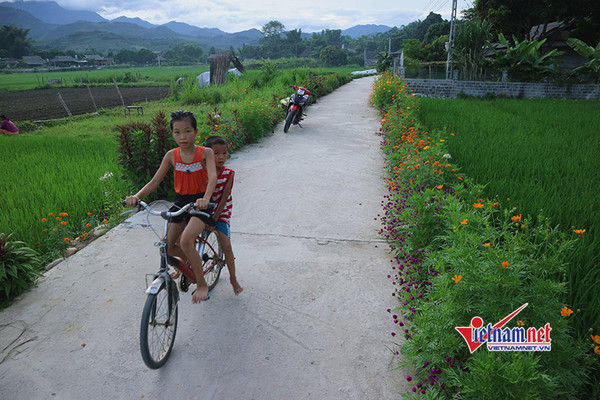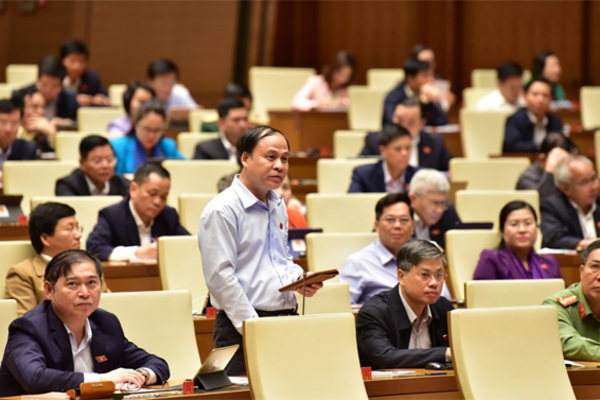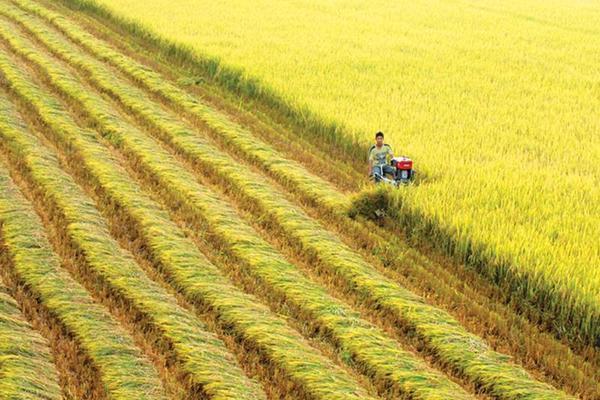 |
|
Integrating and speeding up the implementation of the UN Sustainable Development Goals (SDGs), especially the No. 13 target of timely and effective response to climate change and natural disasters, and No. 14 target of conservation and sustainable use of the ocean, the sea and marine resources before 2030.
|
Sustainable development is not only a commitment of Vietnam to the international community, but also comes from the country’s indispensable needs, in line with the Party's thorough policy of "fast and sustainable development, people and quality of life placed at the center of policy planning and implementation”.
Integrating and speeding up the implementation of the UN Sustainable Development Goals (SDGs), especially the No. 13 target of timely and effective response to climate change and natural disasters, and No. 14 target of conservation and sustainable use of the ocean, the sea and marine resources before 2030.
Speaking at the general discussion session of the high-level meeting of the United Nations Economic and Social Council (ECOSOC) in 2019, with the theme "Increasing power, ensuring equality and comprehension for the people”, Deputy Minister of Planning and Investment Nguyen Van Trung shared Vietnam's experiences in integrating Sustainable Development Goals (SDGs) into the process of developing Vietnam’s social-economic development strategies and the ways to mobilize resources from the public and private sectors as well as foreign resources to implement the SDGs in Vietnam.
He also introduced to international friends the report "Vietnam - Spending Needs to Achieve the Sustainable Development Goal," which was compiled by the International Monetary Fund (IMF) and Vietnam.
 |
|
The National Assembly discussed the overall scheme for socio-economic development in the remote and mountainous areas and the areas in particularly difficult conditions.
|
As one of the few countries that could make this report, Vietnam identified resources to implement the SDGs in five key areas: education, health, transport, rural areas, electricity and water by 2030, with about US$108 billion, of which the public sector can only provide $75.8 billion. The remaining resources can be mobilized from the private sector through public-private partnerships (PPP) projects, ODA and other financial sources. The Vietnamese Government has always determined that if the problem of poverty is not addressed, the development objectives such as economic growth, stability and human rights cannot be fulfilled.
The hunger eradication and poverty reduction policy has become a major policy of the Vietnamese Government. The implementation of the sustainable development goals is mentioned and integrated in the country’s socio-economic development policies, aiming to improving health, education and the physical and spiritual life for people and at the same time protecting the environment and effectively coping with climate change.
The participation of the entire system
The National Assembly recently discussed the overall scheme for socio-economic development in the remote and mountainous areas and the areas in particularly difficult conditions. This will make an important contribution to linking the national socio-economic development goals in each period with the sustainable development goal No. 9 "Eradicating poverty in all forms everywhere" and the sustainable development goal No. 9 "Building solid infrastructure to promote open and sustainable industrialization and encouraging innovation" under the United Nations Sustainable Development Agenda to 2030.
Although Vietnam has achieved many positive achievements related to sustainable development goals, the question is how to engage the community and promote the participation of all parties, especially the poor, disadvantaged groups, to take advantage of technology, innovation and creativity, including the approach to create premises and conditions to solve poverty in the new situation.
Based on that spirit, the Vietnamese State has issued the national action plan to implement the UN Agenda 2030 for sustainable development, attracting the determination of the entire political system.
The National Assembly plays an important role in perfecting the legal framework for building a socialist-oriented market economy, building a socialist rule-of-law state of the people, by the people, for the people, and completing state governance institutions, upholding the supervisory role of the people's power agency. Through the implementation of legislative, supervisory and decision-making functions on important national issues, the National Assembly discussed, passed laws, national strategies, and decided on the budget for the targeted program related to sustainable development, especially in the areas of environmental protection, climate change response, hunger eradication and poverty reduction, caring for ethnic minority and high-risk areas...
 |
|
Integrating and speeding up the implementation of the UN Sustainable Development Goals (SDGs), especially the No. 13 target of timely and effective response to climate change and natural disasters, and No. 14 target of conservation and sustainable use of the ocean, the sea and marine resources before 2030. Illustrative image
|
For the Government, a number of activities have been carried out to raise awareness, strengthen capacity and mobilize the participation of all parties in the implementation of sustainable development goals; actively participated in global and regional forums to share experience and enhance international cooperation to mobilize resources for the implementation of sustainable development goals and to achieve the goal of sustainable poverty reduction in the program on socio-economic development for 16 ethnic minority groups.
The Prime Minister has directed local ministries and agencies to take action to make the 2030 Agenda for sustainable development the focus of the socio-economic development strategy in the 2021-2030 period, with specific plans and tasks. The Prime Minister also requested to speed up the process of restructuring and improving economic institutions in the direction of using natural resources more efficiently, saving energy, raising economic competitiveness, renovating technology, adapting to climate change, reducing poverty, ensuring sustainable economic development.
As a result, after more than two years of implementation, a number of legal documents have been formed, creating a basis for the implementation of sustainable development goals such as Vietnam's Roadmap for the implementation of sustainable development goals to 2030, Action plans of ministries, sectors and localities to implement the 2030 Agenda 2030, and the statistical indicators of Vietnam’s sustainable development.
These are the basic foundations for Vietnam to continue implementing its sustainable development goals and set tasks in the next period.
Tran Hang
 2019 is the year that the Government assesses the key achievements that Vietnam has achieved in the five years of implementing the sustainable development goals and setting tasks for the next period.
2019 is the year that the Government assesses the key achievements that Vietnam has achieved in the five years of implementing the sustainable development goals and setting tasks for the next period.